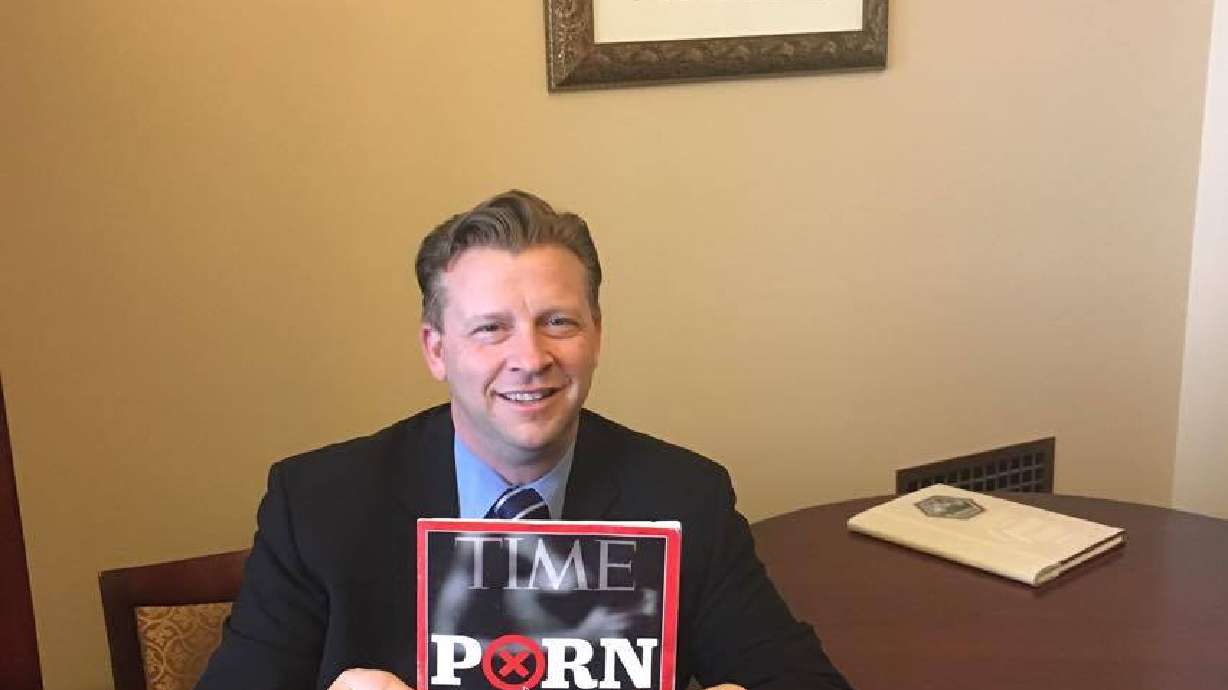Estimated read time: 4-5 minutes
This archived news story is available only for your personal, non-commercial use. Information in the story may be outdated or superseded by additional information. Reading or replaying the story in its archived form does not constitute a republication of the story.
SALT LAKE CITY — Utah state Sen. Todd Weiler is advocating for Senate Bill 185, which would make a person who produces or distributes pornographic material liable for civil damages if a minor is physically or psychologically affected as a result.
“First of all, I think it’s important to know that the bill will only create potential cause of action if it’s a child who is exposed to pornography," Weiler said. "The average age of first exposure to hardcore pornography in Utah is 11. If a child sees pornography, there’s no price tag on that.”
The bill, which was introduced Monday, includes “safe harbor” language, which says that people who produce or distribute pornography in the state can avoid liability by providing a “conspicuous” warning. Weiler compares the warning labels described in the bill to warnings on cigarettes.
"This is a safe harbor, we’re not requiring any website to do this, we’re saying if you want to be immune from lawsuits you have to do this," Weiler said.
Internet service providers and search engines would be immune from any potential lawsuit.
In 2016, the Utah State Legislature passed a resolution that defined pornography as a public health hazard. Other state legislatures are considering filing several resolutions, including Virginia, whose resolution just passed the House.
In the 2016 resolution, pornography's “potential detrimental effects” on “brain development and functioning” are described, and it says that “pornography is potentially biologically addictive.”
For S.B. 185, Weiler said “we’re sending a message” and referenced the resolution and the March 2016 issue of Time magazine where he is quoted. Weiler expressed concerns about adolescents viewing pornography and said, “These preteens are struggling enough — why do we want to mess with their brain chemistry?”
Related:
The statements made by Weiler and the 2016 resolution are not agreed upon by many experts and organizations.
The American Association of Sexuality Educators, Counselors and Therapists (AASECT) made a position statement that “linking problems related to sexual urges, thoughts or behaviors to a porn/sexual addiction process cannot be advanced by AASECT as a standard practice for sexuality education, delivery, counseling or therapy.”
Kristin Hodson, a certified sex therapist in Midvale, spoke to the importance of finding a common ground on this issue and educating students through evidence-based research and media literacy. She expressed concern at some of the statements made and spoke for other sex therapists.
"We are not saying pornography cannot be problematic," she said. "However, we are saying that the pornography is often the symptom of deeper issues that need to be addressed.”
Hodson cites some of these issues as trauma, OCD, depression, anxiety, marital distress and personality disorders and adds “pornography can be the way one copes with things in life, and it can become a dysfunctional way to cope that is not an addiction.”
Another concern is that the definition of pornography is debatable and not defined in the bill.
"There is much to be interpreted. This happens often when it comes to discussions around sexuality," Hodson said. "He has yet to define what pornography is and is legislating around pornography without a working definition that the entire public can work from. It’s dangerous to continue legislating around something where we have not even defined at a public policy level.”
The topic of pornography is a concern of some free speech advocates. Anna Thomas, strategic communications manager of the American Civil Liberties Union of Utah, said “the whole point of the First Amendment and your right of free speech is not only to protect speech that is popular to everyone, but speech people might not approve of.”
Weiler continues his work on this issue. “I’m hoping to get 10-12 states to follow suit,” he said, and also wants to encourage businesses to use filters. “I’m not going to rest until we make some significant progress on this issue.”










